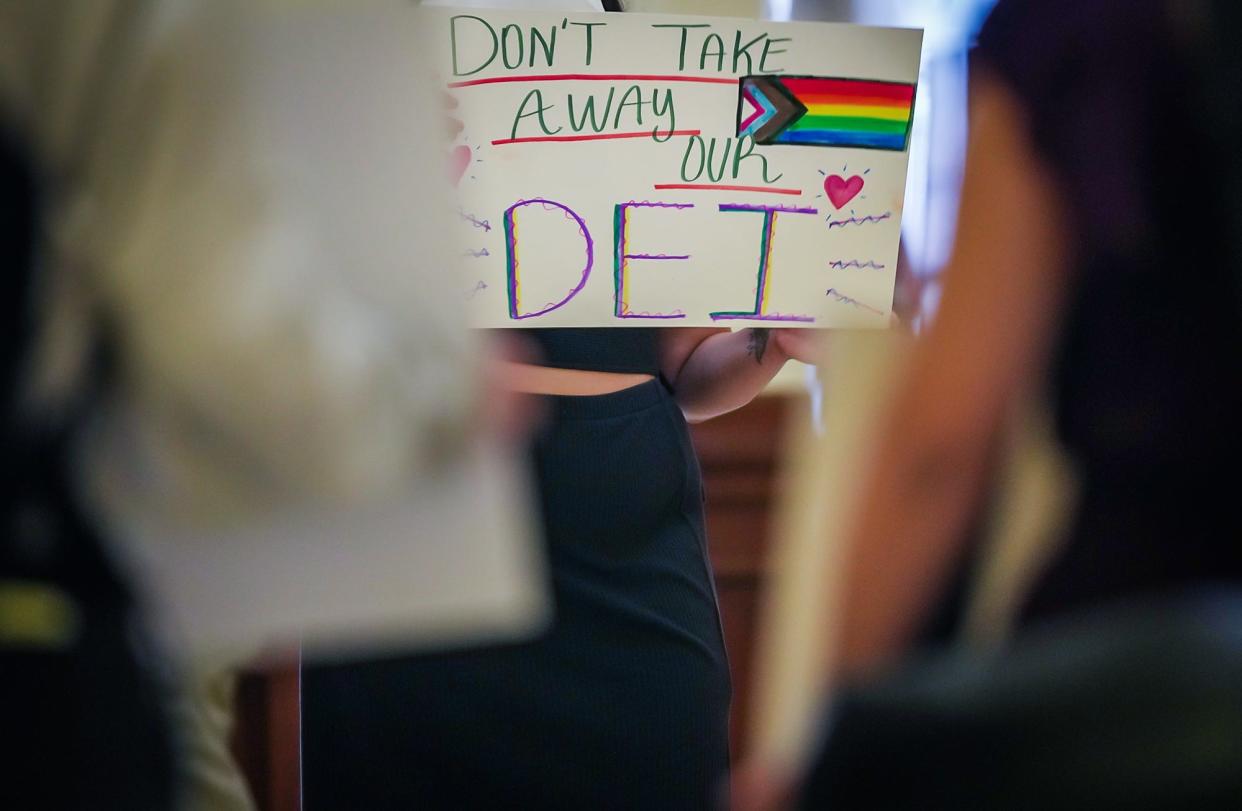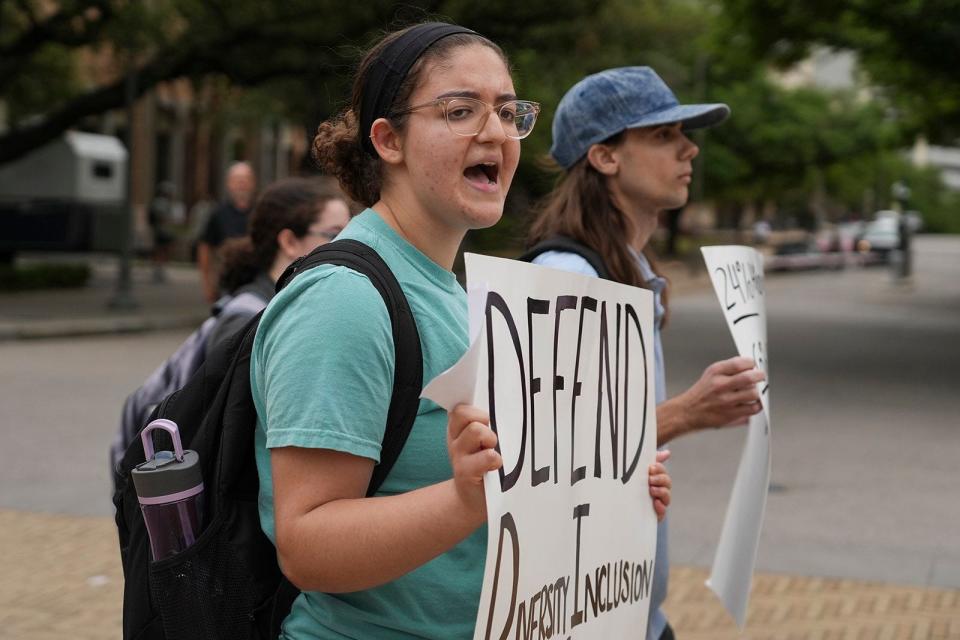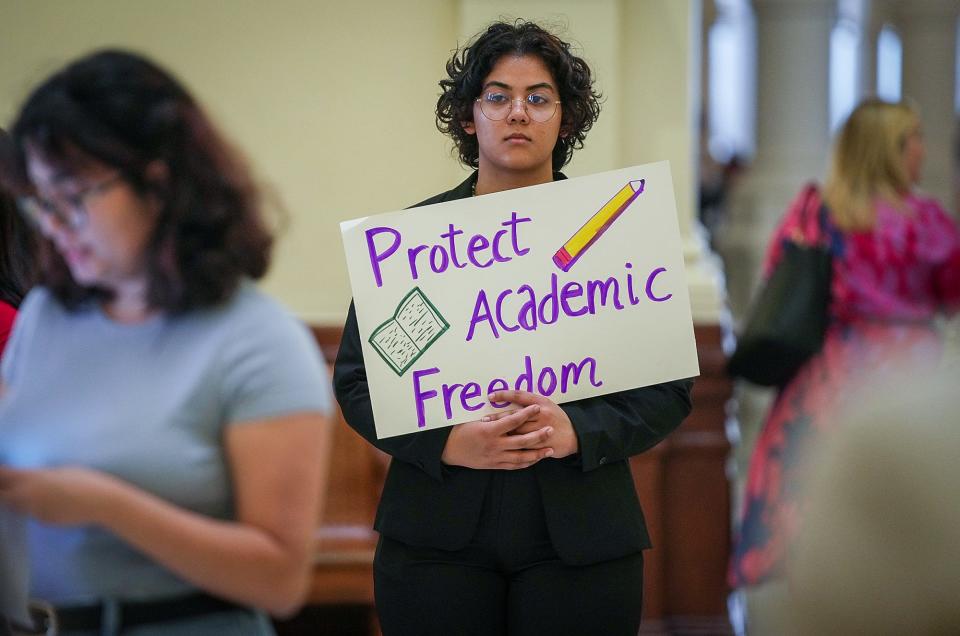When UT students return, 'a home away from home' will have been shuttered due to DEI ban

Miguel Anderson, a senior at the University of Texas from California, came to UT because of its Multicultural Engagement Center.
“Other schools out there have their multicultural engagement centers, but it's not like UT’s,” he said. “They’ve been most impactful on my UT experience.”
Students call the MEC “a home away from home.” At the center, Anderson found friends who invited him over to dinner and gave him financial aid advice — people he’d eventually invite to his birthday party. He joined the Queer Trans Black Indigenous People of Color Agency within it and continued the group's mission of advocacy and creating a safe space as co-director of operations this year.
But on New Year's Eve, he and other student MEC leaders received a message from the center's staff: Because of Texas Senate Bill 17, a new law banning diversity, equity and inclusion offices and initiatives at public institutions of higher education, the center would no longer exist.
The MEC was a resource office that housed six UT-sponsored student groups — Afrikan American Affairs, the Asian Desi Pacific Islander American Collective, the Latino Leadership Council, the Native American and Indigenous Collective, Queer People of Color and Allies, and Students for Equity and Diversity — and provided a gathering place for them.
Despite having served as a safe space for diverse students for 36 years, due to SB 17, the center would shutter its operations effective Jan. 1, when the new law went into effect, according to the center staff's message, obtained by the American-Statesman.
DEI ban at Texas colleges in effect: Here's how some groups are reacting
"They're taking away a legacy of, like, 30 years that was already so hard to achieve,” Anderson said. "This wasn't even yours to begin with, to take away.”
The University confirmed the closure of the center in a statement to the American-Statesman.
"Due to Senate Bill 17 (SB17), the Multicultural Engagement Center (MEC) has closed as of Jan. 1," the University said in a statement sent Sunday night. "The University will consider how best to use the space as part of the Powers Student Activity Center to continue building community for all Longhorns."
The MEC was started by students in 1988 as the Minority Information Center, a student government agency set up to support Black and Hispanic/Latino students. In 1998 it became a part of the Office of Student Affairs with two full-time staff members and expanded its mission to provide resources for all students.
By 2011, the center became part of UT's Division of Diversity and Community Engagement, moved to the Student Activity Center and boasted its last title: the Multicultural Engagement Center. Its now inactive website said it provided leadership development opportunities, support to student organizations, social justice and education training, and cultural immersion experiences. Its Instagram page now states it is “under construction.”

How Texas SB 17 is affecting UT student groups
SB 17, which Gov. Greg Abbott signed into law in June and became effective Jan. 1, prevents public universities from having DEI offices that conduct trainings, programs or activities “designed or implemented in reference to race, color, ethnicity, gender identity or sexual orientation.” Influencing hiring or promoting policies in reference to race, color or ethnicity is also barred, as is having an employee who performs the functions of a DEI office.
The law exempts student groups “registered with or recognized by” a university from compliance but does not specifically address financially supported student groups.
The University of Texas System, which oversees 14 academic and health institutions, including UT-Austin, in November approved its policy regarding SB 17 compliance. The system's rules state that “depending on the level of institutional control and support,” programs and activities of student organizations sponsored by the institutions could be prohibited due to their association with the university and funding.
Under the system's guidance, the six student groups that were previously housed within the MEC must instead become registered student organizations to continue their missions — on their own for funding and programming.
Belonging for all: What UT is changing to comply with the state's DEI ban at colleges
Christian Mira, the QTBIPOC agency's financial director, said the group's yearly budget for events had been $8,000.
Other financially supported groups at UT have also been affected. Mira, who also serves as Student Government chief of staff, said the university told leaders that it will monitor the group’s programming for compliance with SB 17.
“They've always been under review because obviously the financial restrictions and bureaucracy of hosting events within an institution, but specifically under that lens, it's never been done before,” Mira said.
Student Government, described on UT’s website as “the official association for the expression of student opinion,” has also had to dissolve the Queer and Trans Student Alliance, Mira said. The group helped organize the 2022 report on the state of LGBTQIA+ affairs at UT. The report surveyed 2,000 UT students and found that LGBTQ+ students, particularly students of color, reported feeling less safe than their straight counterparts.
As part of its compliance with SB 17, UT on Dec. 14 announced that its Division of Diversity and Community Engagement has transformed to the Division of Campus and Community Engagement. And its Gender and Sexuality Center has become the Women’s Community Center, according to the new website.
“These are some of the only spaces that people feel comfortable with,” Anderson said. “I know that if they were thinking about threatening the MEC first or announced it, there would have been so much backlash.”

How Texas students are adapting to DEI ban
Izabella De La Garza, a 2023 UT graduate and a lead organizer of Texas Students for DEI, a group that advocated against SB 17, described the MEC as a “vital” resource during her time at UT.
"The MEC especially was somewhere where I found a lot of comfort and solace,” De La Garza said. “It was somewhere safe for me and somewhere I could be myself, which I found at UT there wasn't always spaces where I could do that.”
'Exhausted', 'confused,' 'unprecedented': Texas professors, students reflect on DEI ban
De La Garza helped lead the Latinx Community Affairs agency, a group that hosted UT’s Latinx graduation ceremony, community engagement and leadership events. De La Garza said she is concerned about the longevity of the MEC agencies and their services without institutional support and funding.
But Mira remains optimistic.
“It's a loss to the campus and to students,” Mira said, “but it's also an opportunity for us to maybe expand in ways because we're not under that same level of restriction.”
Mira joined QTBIPOCA this year, accepting a position created to prepare the agency to become financially independent. Since then, the group has filed documents with the IRS, opened a bank account at University Federal Credit Union, and crafted sponsor kits and budget sheets to share with potential donors, he said. The goal is to raise more than $10,000 to continue to run and bolster its programs, including the annual Leadership Institute and social, educational and advocacy events.
“It’s not just an unsophisticated asking for money. There's a purpose and intention behind every dollar that we would receive,” Mira said. “We're just trying to make people feel welcomed, and it's an increasingly more important objective, especially given the circumstances of the Texas Legislature and the taking away of resources that we've seen.”
With UT students returning to classes Tuesday for the spring semester, Mira said all are welcome at QTBIPOCA events.
Anderson said he hopes being independent will give QTBIPOCA more freedom to control and increase its activism without the same oversight from the university.
“The DEI work is not going to go away,” Anderson said.
This article originally appeared on Austin American-Statesman: UT Multicultural Engagement Center closes as Texas DEI ban takes hold

